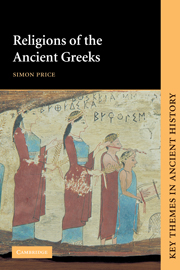Book contents
- Frontmatter
- Contents
- List of figures
- Preface
- List of abbreviations
- 1 Introduction
- 2 Gods, myths and festivals
- 3 Religious places
- 4 Authority, control and crisis
- 5 Girls and boys, women and men
- 6 Elective cults
- 7 Greek thinkers
- 8 Reactions to Greek religions
- Appendix of Greek inscriptions in translation
- Bibliographical essay
- Bibliography
- Index
- Frontmatter
- Contents
- List of figures
- Preface
- List of abbreviations
- 1 Introduction
- 2 Gods, myths and festivals
- 3 Religious places
- 4 Authority, control and crisis
- 5 Girls and boys, women and men
- 6 Elective cults
- 7 Greek thinkers
- 8 Reactions to Greek religions
- Appendix of Greek inscriptions in translation
- Bibliographical essay
- Bibliography
- Index
Summary
Religious involvement of women and men at various stages during the life cycle generally resulted not from individual choices but from social expectations. For example, ephebes had certain religious functions prescribed for them by the assembly, and at marriages brides and grooms (and their families) performed fixed traditional rituals. Households were expected to have their cults of Zeus Ktesios. Participation by individuals in the regular cycle of civic festivals was also a matter of social expectation. Citizens were supposed to be present at the major festivals; women were appointed to perform the Thesmophoria.
Choices, however, did also exist within the framework of civic cults. Parents must have chosen to put forward their children to serve in particular cults. Individuals also chose to make dedications in civic sanctuaries, or to consult oracles. And women and men could decide to seek initiation at the Eleusinian Mysteries. Such choices may have been the result of greater or lesser levels of interest in the cults of one's own or other cities. Some no doubt had a fairly distant relationship to ordinary cults, like the bad-tempered man in Menander's play who (according to the prologue, spoken by Pan) has never opened a conversation with anyone. ‘Except that, being my neighbour, he will speak in passing to me, Pan, because he's obliged to; but I'm sure that a moment later he wishes he hadn't.’
- Type
- Chapter
- Information
- Religions of the Ancient Greeks , pp. 108 - 125Publisher: Cambridge University PressPrint publication year: 1999

